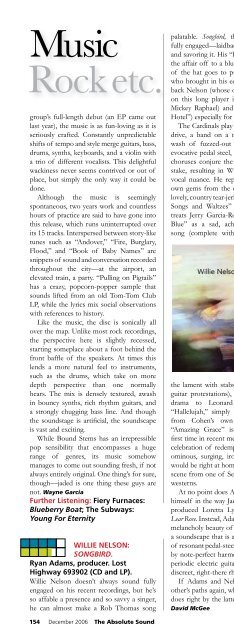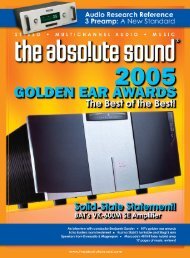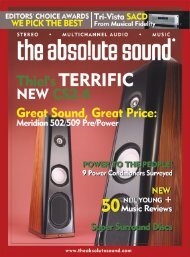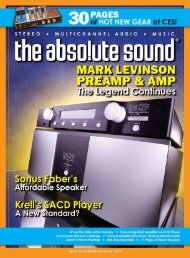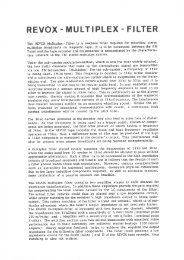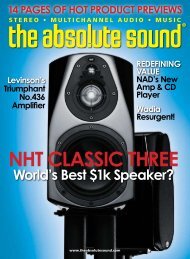Create successful ePaper yourself
Turn your PDF publications into a flip-book with our unique Google optimized e-Paper software.
Music<br />
Rock etc.<br />
group’s full-length debut (an EP came out<br />
last year), the music is as fun-loving as it is<br />
seriously crafted. Constantly unpredictable<br />
shifts of tempo and style merge guitars, bass,<br />
drums, synths, keyboards, and a violin with<br />
a trio of different vocalists. This delightful<br />
wackiness never seems contrived or out of<br />
place, but simply the only way it could be<br />
done.<br />
Although the music is seemingly<br />
spontaneous, two years work and countless<br />
hours of practice are said to have gone into<br />
this release, which runs uninterrupted over<br />
its 15 tracks. Interspersed between story-like<br />
tunes such as “Andover,” “Fire, Burglary,<br />
Flood,” and “Book of Baby Names” are<br />
snippets of sound and conversation recorded<br />
throughout the city—at the airport, an<br />
elevated train, a party. “Pulling on Pigtails”<br />
has a crazy, popcorn-popper sample that<br />
sounds lifted from an old Tom-Tom Club<br />
LP, while the lyrics mix social observations<br />
with references to history.<br />
Like the music, the disc is sonically all<br />
over the map. Unlike most rock recordings,<br />
the perspective here is slightly recessed,<br />
starting someplace about a foot behind the<br />
front baffle of the speakers. At times this<br />
lends a more natural feel to instruments,<br />
such as the drums, which take on more<br />
depth perspective than one normally<br />
hears. The mix is densely textured, awash<br />
in bouncy synths, rich rhythm guitars, and<br />
a strongly chugging bass line. And though<br />
the soundstage is artificial, the soundscape<br />
is vast and exciting.<br />
While Bound Stems has an irrepressible<br />
pop sensibility that encompasses a huge<br />
range of genres, its music somehow<br />
manages to come out sounding fresh, if not<br />
always entirely original. One thing’s for sure,<br />
though—jaded is one thing these guys are<br />
not. Wayne Garcia<br />
Further Listening: Fiery Furnaces:<br />
Blueberry Boat; The Subways:<br />
Young For Eternity<br />
Willie Nelson:<br />
Songbird.<br />
Ryan Adams, producer. Lost<br />
Highway 693902 (CD and LP).<br />
Willie Nelson doesn’t always sound fully<br />
engaged on his recent recordings, but he’s<br />
so affable a presence and so savvy a singer,<br />
he can almost make a Rob Thomas song<br />
154 December 2006 The Absolute Sound<br />
palatable. Songbird, though, finds Nelson<br />
fully engaged—laidback, but in the moment<br />
and savoring it. His “Rainy Day Blues” gets<br />
the affair off to a bluesy, boozy start. A tip<br />
of the hat goes to producer Ryan Adams,<br />
who brought in his edgy Cardinals band to<br />
back Nelson (whose only “family” member<br />
on this long player is harmonica maestro<br />
Mickey Raphael) and wrote a song (“Blue<br />
Hotel”) especially for the artist.<br />
The Cardinals play with a twangy, sludgy<br />
drive, a band on a mission, and its thick<br />
wash of fuzzed-out guitar, gospel organ,<br />
evocative pedal steel, and occasional gospel<br />
choruses conjure the feel of something at<br />
stake, resulting in Willie digging deep for<br />
vocal nuance. He reprises a couple of his<br />
own gems from the catalogue (including a<br />
lovely, country tear-jerking treatment of “Sad<br />
Songs and Waltzes” from Shotgun Willie),<br />
treats Jerry Garcia-Robert Hunter’s “Stella<br />
Blue” as a sad, achingly beautiful torch<br />
song (complete with Adams punctuating<br />
the lament with stabs of jangling, howling<br />
guitar protestations), and brings Brechtian<br />
drama to Leonard Cohen’s venerated<br />
“Hallelujah,” simply by copping character<br />
from Cohen’s own desiccated reading.<br />
“Amazing Grace” is reimagined for the<br />
first time in recent memory, not as a gospel<br />
celebration of redemption but rather as an<br />
ominous, surging, ironic blues ballad that<br />
would be right at home in a blood-spattered<br />
scene from one of Sergio Leone’s spaghetti<br />
westerns.<br />
At no point does Adams call attention to<br />
himself in the way Jack White did when he<br />
produced Loretta Lynn’s remarkable Van<br />
Lear Rose. Instead, Adams speaks through the<br />
melancholy beauty of “Blue Hotel,” and via<br />
a soundscape that is a well-balanced palette<br />
of resonant pedal-steel moans supplemented<br />
by note-perfect harmonica embellishments,<br />
periodic electric guitar commentary, and a<br />
discreet, right-there rhythm section.<br />
If Adams and Nelson never cross each<br />
other’s paths again, what they’ve left behind<br />
does right by the latter’s formidable legacy.<br />
David McGee<br />
Further Listening: Loretta Lynn: Van<br />
Lear Rose; The Byrds: Dr. Byrds &<br />
Mr. Hyde<br />
Chris Thile: How<br />
To Grow a Woman<br />
From the Ground.<br />
Thile, producer. Sugar Hill 4017.<br />
At the ripe ol’ age of 25, Chris Thile has<br />
taken his fans on some kind of journey,<br />
both with Nickel Creek and especially on<br />
fascinating solo projects on which he has<br />
challenged himself by pairing with seasoned<br />
virtuosos on the order of Mike Marshall,<br />
Bela Fleck, Edgar Meyer, Byron House, and<br />
Jerry Douglas—be it doing a scintillating<br />
one-man-band show (2004’s Deceiver) or,<br />
on the album here, fronting a relatively<br />
unknown bluegrass quartet and again testing<br />
the genre’s progressive boundaries.<br />
Thile hails How to Grow a Woman from<br />
the Ground—the folkish title song about an<br />
obsessive love is from L.A.-based singersongwriter,<br />
Tom Brosseau (review, Issue<br />
156) whom Thile is right to champion—as<br />
his return to pure bluegrass, but he offers<br />
an expansive definition of the form. His<br />
original songs are cut from familiar cloth:<br />
an instrumental breakdown that is both<br />
traditional and progressive (the showcase<br />
of fleet-fingered picking, “Watch ’at<br />
Breakdown”) and somber, winsome tales<br />
of splintered love affairs, the dissolution<br />
of which he sees as magnifying his own<br />
shortcomings as a companion, so much so<br />
that when he opens himself up to a new<br />
possibility in “I’m Yours If You Want Me,”<br />
his acute fatalism leaves no room for the<br />
song to be anything other than the spare<br />
dirge it is.<br />
Lightening up a bit, he brings rootsy<br />
grandeur to Jack White’s recondite “Dead<br />
Leaves and the Dirty Ground,” casting it as<br />
a stomping, bluesy entreaty. And on Julian<br />
Casablancas’ “Heart In a Cage,” he hears<br />
a gospel cry where others might find only<br />
petulance. Recorded in live takes around a<br />
pair of mics, the music jumps out of the<br />
speakers. The passion emanating from the<br />
vibrant, cleanly articulated instrumental<br />
solos and dialogues is near palpable (and


